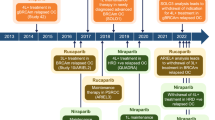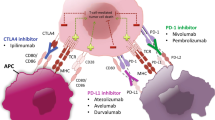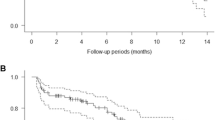Summary
Background Dual inhibition of activated MAPK and mTOR signaling pathways may enhance the antitumor efficacy of the MEK 1/2 inhibitor pimasertib and the mTOR inhibitor temsirolimus given in combination. Methods In this phase I study, patients with refractory advanced solid tumors (NCT01378377) received once-weekly temsirolimus plus once-daily oral pimasertib in 21-day cycles in a modified 3 + 3 dose-escalation design. The maximum tolerated dose (MTD) and recommended phase 2 dose (RP2D) of pimasertib in combination with temsirolimus, safety and pharmacokinetics (PK) were investigated. Results Of 33 patients evaluated, all experienced ≥1 treatment-emergent adverse event (TEAE) and 31 had treatment-related TEAEs, most frequently stomatitis and thrombocytopenia. TEAEs were reversible. No deaths were attributed to treatment. Nine patients had dose-limiting toxicities (stomatitis, thrombocytopenia, serum creatinine phosphokinase increase, visual impairment) and the MTD was determined as 45 mg/day pimasertib plus 25 mg/week temsirolimus. However, due to overlapping toxicities no further investigations were performed and the RP2D was not defined. PK profiles of both agents were not adversely affected. Seventeen patients (17/26 patients) had a best response of stable disease; five had stable disease lasting >12 weeks. Conclusions The RP2D was not defined and the pimasertib plus temsirolimus combination investigated did not warrant further study.



Similar content being viewed by others
References
Grant S (2008) Cotargeting survival signaling pathways in cancer. J Clin Invest 118(9):3003–3006. doi:10.1172/jci36898
Chappell WH, Steelman LS, Long JM, Kempf RC, Abrams SL, Franklin RA, Basecke J, Stivala F, Donia M, Fagone P, Malaponte G, Mazzarino MC, Nicoletti F, Libra M, Maksimovic-Ivanic D, Mijatovic S, Montalto G, Cervello M, Laidler P, Milella M, Tafuri A, Bonati A, Evangelisti C, Cocco L, Martelli AM, McCubrey JA (2011) Ras/Raf/MEK/ERK and PI3K/PTEN/Akt/mTOR inhibitors: rationale and importance to inhibiting these pathways in human health. Oncotarget 2(3):135–164. doi:10.18632/oncotarget.240
Hoshino R, Chatani Y, Yamori T, Tsuruo T, Oka H, Yoshida O, Shimada Y, Ari-i S, Wada H, Fujimoto J, Kohno M (1999) Constitutive activation of the 41-/43-kDa mitogen-activated protein kinase signaling pathway in human tumors. Oncogene 18(3):813–822. doi:10.1038/sj.onc.1202367
Ligresti G, Militello L, Steelman LS, Cavallaro A, Basile F, Nicoletti F, Stivala F, McCubrey JA, Libra M (2009) PIK3CA mutations in human solid tumors: role in sensitivity to various therapeutic approaches. Cell Cycle 8(9):1352–1358
Wee S, Jagani Z, Xiang KX, Loo A, Dorsch M, Yao YM, Sellers WR, Lengauer C, Stegmeier F (2009) PI3K pathway activation mediates resistance to MEK inhibitors in KRAS mutant cancers. Cancer Res 69(10):4286–4293. doi:10.1158/0008-5472.can-08-4765
Kinkade CW, Castillo-Martin M, Puzio-Kuter A, Yan J, Foster TH, Gao H, Sun Y, Ouyang X, Gerald WL, Cordon-Cardo C, Abate-Shen C (2008) Targeting AKT/mTOR and ERK MAPK signaling inhibits hormone-refractory prostate cancer in a preclinical mouse model. J Clin Invest 118(9):3051–3064. doi:10.1172/jci34764
Liu Z, Hou P, Ji M, Guan H, Studeman K, Jensen K, Vasko V, El-Naggar AK, Xing M (2008) Highly prevalent genetic alterations in receptor tyrosine kinases and phosphatidylinositol 3-kinase/akt and mitogen-activated protein kinase pathways in anaplastic and follicular thyroid cancers. J Clin Endocrinol Metab 93(8):3106–3116. doi:10.1210/jc.2008-0273
Russo AE, Torrisi E, Bevelacqua Y, Perrotta R, Libra M, McCubrey JA, Spandidos DA, Stivala F, Malaponte G (2009) Melanoma: molecular pathogenesis and emerging target therapies (Review). Int J Oncol 34(6):1481–1489
Simi L, Pratesi N, Vignoli M, Sestini R, Cianchi F, Valanzano R, Nobili S, Mini E, Pazzagli M, Orlando C (2008) High-resolution melting analysis for rapid detection of KRAS, BRAF, and PIK3CA gene mutations in colorectal cancer. Am J Clin Pathol 130(2):247–253. doi:10.1309/lwdy1axhxuulnvhq
Tsao H, Goel V, Wu H, Yang G, Haluska FG (2004) Genetic interaction between NRAS and BRAF mutations and PTEN/MMAC1 inactivation in melanoma. J Invest Dermatol 122(2):337–341. doi:10.1046/j.0022-202X.2004.22243.x
Carracedo A, Ma L, Teruya-Feldstein J, Rojo F, Salmena L, Alimonti A, Egia A, Sasaki AT, Thomas G, Kozma SC, Papa A, Nardella C, Cantley LC, Baselga J, Pandolfi PP (2008) Inhibition of mTORC1 leads to MAPK pathway activation through a PI3K-dependent feedback loop in human cancer. J Clin Invest 118(9):3065–3074. doi:10.1172/jci34739
Shimizu T, Tolcher AW, Papadopoulos KP, Beeram M, Rasco DW, Smith LS, Gunn S, Smetzer L, Mays TA, Kaiser B, Wick MJ, Alvarez C, Cavazos A, Mangold GL, Patnaik A (2012) The clinical effect of the dual-targeting strategy involving PI3K/AKT/mTOR and RAS/MEK/ERK pathways in patients with advanced cancer. Clin Cancer Res 18(8):2316–2325. doi:10.1158/1078-0432.ccr-11-2381
Chang Q, Chen E, Hedley DW (2009) Effects of combined inhibition of MEK and mTOR on downstream signaling and tumor growth in pancreatic cancer xenograft models. Cancer Biol Ther 8(20):1893–1901
Dankort D, Curley DP, Cartlidge RA, Nelson B, Karnezis AN, Damsky WE Jr, You MJ, DePinho RA, McMahon M, Bosenberg M (2009) Braf (V600E) cooperates with Pten loss to induce metastatic melanoma. Nat Genet 41(5):544–552. doi:10.1038/ng.356
Hoeflich KP, O’Brien C, Boyd Z, Cavet G, Guerrero S, Jung K, Januario T, Savage H, Punnoose E, Truong T, Zhou W, Berry L, Murray L, Amler L, Belvin M, Friedman LS, Lackner MR (2009) In vivo antitumor activity of MEK and phosphatidylinositol 3-kinase inhibitors in basal-like breast cancer models. Clin Cancer Res 15(14):4649–4664. doi:10.1158/1078-0432.ccr-09-0317
Huynh H (2010) AZD6244 (ARRY-142886) enhances the antitumor activity of rapamycin in mouse models of human hepatocellular carcinoma. Cancer 116(5):1315–1325. doi:10.1002/cncr.24863
Jin N, Jiang T, Rosen DM, Nelkin BD, Ball DW (2009) Dual inhibition of mitogen-activated protein kinase kinase and mammalian target of rapamycin in differentiated and anaplastic thyroid cancer. J Clin Endocrinol Metab 94(10):4107–4112. doi:10.1210/jc.2009-0662
Legrier ME, Yang CP, Yan HG, Lopez-Barcons L, Keller SM, Perez-Soler R, Horwitz SB, McDaid HM (2007) Targeting protein translation in human non small cell lung cancer via combined MEK and mammalian target of rapamycin suppression. Cancer Res 67(23):11300–11308. doi:10.1158/0008-5472.can-07-0702
Zhang YJ, Tian XQ, Sun DF, Zhao SL, Xiong H, Fang JY (2009) Combined inhibition of MEK and mTOR signaling inhibits initiation and progression of colorectal cancer. Cancer Invest 27(3):273–285. doi:10.1080/07357900802314893
Naing A (2013) Overcoming resistance to mTOR inhibition for enhanced strategies in clinical trials. Expert Opin Investig Drugs 22(6):679–685. doi:10.1517/13543784.2013.795947
Kim K, Kong SY, Fulciniti M, Li X, Song W, Nahar S, Burger P, Rumizen MJ, Podar K, Chauhan D, Hideshima T, Munshi NC, Richardson P, Clark A, Ogden J, Goutopoulos A, Rastelli L, Anderson KC, Tai YT (2010) Blockade of the MEK/ERK signalling cascade by AS703026, a novel selective MEK1/2 inhibitor, induces pleiotropic anti-myeloma activity in vitro and in vivo. Br J Haematol 149(4):537–549. doi:10.1111/j.1365-2141.2010.08127.x
Yoon J, Koo KH, Choi KY (2011) MEK1/2 inhibitors AS703026 and AZD6244 may be potential therapies for KRAS mutated colorectal cancer that is resistant to EGFR monoclonal antibody therapy. Cancer Res 71(2):445–453. doi:10.1158/0008-5472.CAN-10-3058
Park SJ, Hong SW, Moon JH, Jin DH, Kim JS, Lee CK, Kim KP, Hong YS, Choi EK, Lee JS, Lee JL, Kim TW (2013) The MEK1/2 inhibitor AS703026 circumvents resistance to the BRAF inhibitor PLX4032 in human malignant melanoma cells. Am J Med Sci 346(6):494–498. doi:10.1097/MAJ.0b013e318298a185
Awada A, Delord JP, Houédé N, Lebbe C, Lesimple T, Schellens JHM, Rottey S, Kefford R, Rejeb N, Raymond E (2012) Safety and recommended phase II dose (RP2D) of the selective oral MEK1/2 inhibitor pimasertib (MSC1936369B/AS703026): Results of a phase I trial [Abstract]. Eur J Cancer 48:185–186 (Abstr 604)
Macarulla T, Cervantes A, Tabernero J, Rosello S, Van Cutsem E, Tejpar S, Prenen H, Martinelli E, Troiani T, Laffranchi B, Jego V, von Richter O, Ciardiello F (2015) Phase I study of FOLFIRI plus pimasertib as second-line treatment for KRAS-mutated metastatic colorectal cancer. Br J Cancer 112(12):1874–1881. doi:10.1038/bjc.2015.144
Martinelli E, Troiani T, D’Aiuto E, Morgillo F, Vitagliano D, Capasso A, Costantino S, Ciuffreda LP, Merolla F, Vecchione L, De Vriendt V, Tejpar S, Nappi A, Sforza V, Martini G, Berrino L, De Palma R, Ciardiello F (2013) Antitumor activity of pimasertib, a selective MEK 1/2 inhibitor, in combination with PI3K/mTOR inhibitors or with multi-targeted kinase inhibitors in pimasertib-resistant human lung and colorectal cancer cells. Int J Cancer 133(9):2089–2101. doi:10.1002/ijc.28236
TORISEL SMPC (2015) TORISEL - temsirolimus prescribing information. Wyeth Pharmaceuticals Inc. (a subsidiary of Pfizer Inc.). http://labeling.pfizer.com/showlabeling.aspx?id=490. Accessed Mar 2016
Chan S, Scheulen ME, Johnston S, Mross K, Cardoso F, Dittrich C, Eiermann W, Hess D, Morant R, Semiglazov V, Borner M, Salzberg M, Ostapenko V, Illiger HJ, Behringer D, Bardy-Bouxin N, Boni J, Kong S, Cincotta M, Moore L (2005) Phase II study of temsirolimus (CCI-779), a novel inhibitor of mTOR, in heavily pretreated patients with locally advanced or metastatic breast cancer. J Clin Oncol 23(23):5314–5322. doi:10.1200/jco.2005.66.130
O’Donnell PH, Ratain MJ (2007) Evaluating the activity of temsirolimus in neuroendocrine cancer. Br J Cancer 96(1):177. doi:10.1038/sj.bjc.6603513, author reply 178-179
Oza AM, Elit L, Provencher D, Biagi JJ, Panasci L, Sederias J, Dancey JE, Tsao MS, Eisenhauer EA (2008) A phase II study of temsirolimus (CCI-779) in patients with metastatic and/or locally advanced recurrent endometrial cancer previously treated with chemotherapy: NCIC CTG IND 160b. ASCO Meet Abstr 26(15_suppl):5516
Folkes AJ, Ahmadi K, Alderton WK, Alix S, Baker SJ, Box G, Chuckowree IS, Clarke PA, Depledge P, Eccles SA, Friedman LS, Hayes A, Hancox TC, Kugendradas A, Lensun L, Moore P, Olivero AG, Pang J, Patel S, Pergl-Wilson GH, Raynaud FI, Robson A, Saghir N, Salphati L, Sohal S, Ultsch MH, Valenti M, Wallweber HJ, Wan NC, Wiesmann C, Workman P, Zhyvoloup A, Zvelebil MJ, Shuttleworth SJ (2008) The identification of 2-(1H-indazol-4-yl)-6-(4-methanesulfonyl-piperazin-1-ylmethyl)-4-morpholin-4-yl-t hieno[3,2-d]pyrimidine (GDC-0941) as a potent, selective, orally bioavailable inhibitor of class I PI3 kinase for the treatment of cancer. J Med Chem 51(18):5522–5532. doi:10.1021/jm800295d
Hoeflich KP, Merchant M, Orr C, Chan J, Den Otter D, Berry L, Kasman I, Koeppen H, Rice K, Yang NY, Engst S, Johnston S, Friedman LS, Belvin M (2012) Intermittent administration of MEK inhibitor GDC-0973 plus PI3K inhibitor GDC-0941 triggers robust apoptosis and tumor growth inhibition. Cancer Res 72(1):210–219. doi:10.1158/0008-5472.can-11-1515
Smalley KS, Haass NK, Brafford PA, Lioni M, Flaherty KT, Herlyn M (2006) Multiple signaling pathways must be targeted to overcome drug resistance in cell lines derived from melanoma metastases. Mol Cancer Ther 5(5):1136–1144. doi:10.1158/1535-7163.mct-06-0084
Sos ML, Fischer S, Ullrich R, Peifer M, Heuckmann JM, Koker M, Heynck S, Stuckrath I, Weiss J, Fischer F, Michel K, Goel A, Regales L, Politi KA, Perera S, Getlik M, Heukamp LC, Ansen S, Zander T, Beroukhim R, Kashkar H, Shokat KM, Sellers WR, Rauh D, Orr C, Hoeflich KP, Friedman L, Wong KK, Pao W, Thomas RK (2009) Identifying genotype-dependent efficacy of single and combined PI3K- and MAPK-pathway inhibition in cancer. Proc Natl Acad Sci U S A 106(43):18351–18356. doi:10.1073/pnas.0907325106
Abdel-Rahman O, Fouad M (2015) Risk of oral and gastrointestinal mucosal injury in patients with solid tumors treated with everolimus, temsirolimus or ridaforolimus: a comparative systematic review and meta-analysis. Expert Rev Anticancer Ther 15(7):847–858. doi:10.1586/14737140.2015.1047350
Shameem R, Lacouture M, Wu S (2015) Incidence and risk of high-grade stomatitis with mTOR inhibitors in cancer patients. Cancer Invest 33(3):70–77. doi:10.3109/07357907.2014.1001893
Liu X, Lorusso P, Mita M, Piha-Paul S, Hong DS, Fu S, McQuinn L, Asatiani E, Doyle LA, Chen HX, Hess KR, Kurzrock R, Naing A (2014) Incidence of mucositis in patients treated with temsirolimus-based regimens and correlation to treatment response. Oncologist 19(4):426–428. doi:10.1634/theoncologist.2013-0231
Duncan KE, Chang LY, Patronas M (2015) MEK inhibitors: a new class of chemotherapeutic agents with ocular toxicity. Eye (Lond) 29(8):1003–1012. doi:10.1038/eye.2015.82
Tolcher AW, Bendell JC, Papadopoulos KP, Burris HA 3rd, Patnaik A, Jones SF, Rasco D, Cox DS, Durante M, Bellew KM, Park J, Le NT, Infante JR (2015) A phase IB trial of the oral MEK inhibitor trametinib (GSK1120212) in combination with everolimus in patients with advanced solid tumors. Ann Oncol 26(1):58–64. doi:10.1093/annonc/mdu482
Acknowledgements
The authors would like to thank patients and their families, investigators, co-investigators and the study teams at the participating centers and at Merck KGaA, Darmstadt, Germany and EMD Serono, Billerica, USA (an affiliate of Merck KGaA, Darmstadt, Germany). Our thanks also to Ekaterine Asatiani for her contribution to the study and guidance on this manuscript. Wei Guo’s current affiliation is TESARO Inc. Waltham, USA. This study was sponsored by Merck KGaA, Darmstadt, Germany and EMD Serono Inc., Billerica, USA. Medical writing assistance was provided by Helen Swainston, Bioscript Science, Macclesfield, UK and funded by Merck KGaA, Darmstadt, Germany.
Author information
Authors and Affiliations
Corresponding author
Ethics declarations
Conflict of interest
M Mita has no conflicts of interest to declare.
S Fu has no conflicts of interest to declare.
SA Piha-Paul has no conflicts of interest to declare.
F Janku has no conflicts of interest to declare.
A Mita has no conflicts of interest to declare.
R Natale has no conflicts of interest to declare.
W Guo was an employee of EMD Serono Inc, Billerica, USA who sponsored this trial.
C Zhao is an employee of EMD Serono Inc., Billerica, USA who sponsored this trial.
R Kurzrock has research funding from Genentech, Merck Serono, Pfizer, Sequenom, Foundation Medicine, and Guardant, as well as consultant/advisory board fees from Sequenom, Actuate Therapeutics, and Xbiotech, and an ownership interest in Novena, Inc. and Curematch, Inc.
A Naing has no conflicts of interest to declare.
Funding
This study was sponsored by Merck KGaA, Darmstadt, Germany and EMD Serono Inc., Billerica, USA.
Ethical approval
Written informed consent was obtained from all patients prior to study initiation. All procedures performed in studies involving human participants were in accordance with the ethical standards of the institution of the participating centers and with the 1964 Helsinki declaration and its later amendments.
Electronic supplementary material
Below is the link to the electronic supplementary material.
Supplementary Table 1
(DOCX 43 kb)
Supplementary Table 2
(DOCX 40 kb)
Supplementary Table 3
(DOCX 39 kb)
Rights and permissions
About this article
Cite this article
Mita, M., Fu, S., Piha-Paul, S.A. et al. Phase I trial of MEK 1/2 inhibitor pimasertib combined with mTOR inhibitor temsirolimus in patients with advanced solid tumors. Invest New Drugs 35, 616–626 (2017). https://doi.org/10.1007/s10637-017-0442-3
Received:
Accepted:
Published:
Issue Date:
DOI: https://doi.org/10.1007/s10637-017-0442-3




